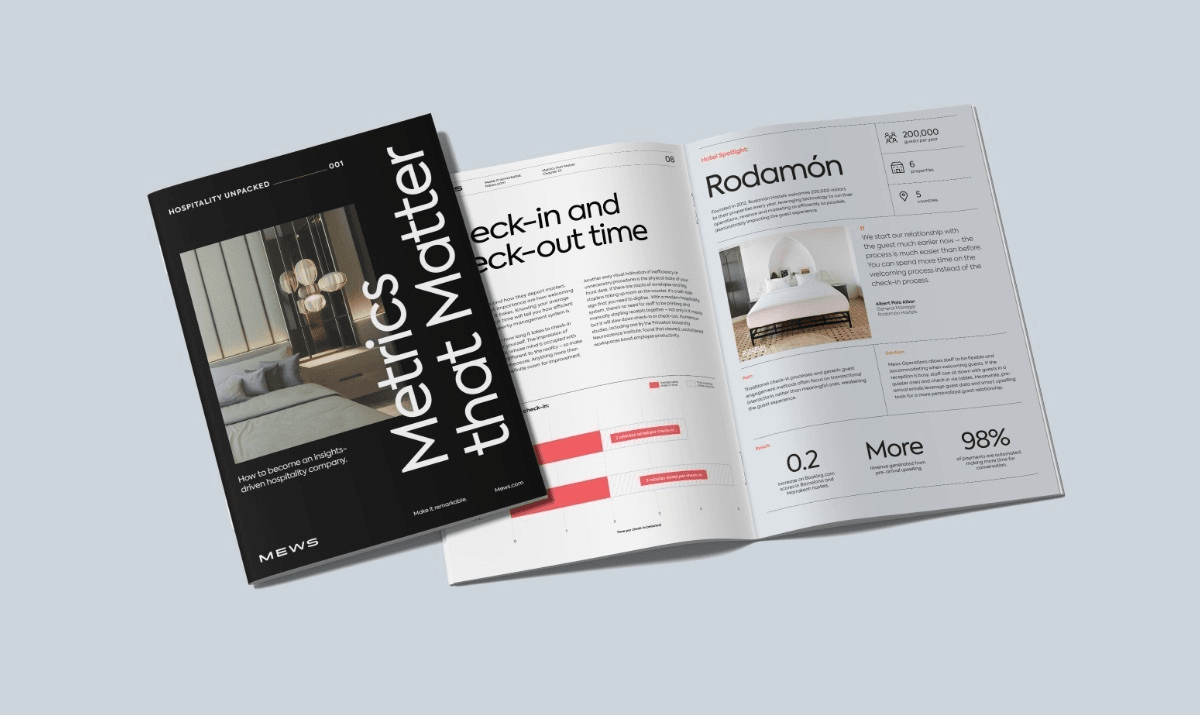Overbooking in hotel management is a long-standing, widely used practice - and an equally divisive one. Many hoteliers consider it a necessary evil: a practical defence against cancellations and no-shows. Yet it sits uncomfortably with most managers, especially during peak periods when you're forced to walk guests and face the fallout. Empty rooms due to late cancellations hurt your margins, but overbooking mishandled can have the same effect on guest loyalty.
To protect against this, many hotel and revenue managers rely on an overbooking strategy to maximise occupancy and revenue without sacrificing guest satisfaction. In this guide, we'll explore what overbooking really means, why it remains a core hotel management tactic, and the strategies that help hotels execute it effectively and responsibly.
What is a hotel overbooking strategy?
A hotel overbooking strategy means selling more rooms than the property physically has available for a given night. Much like airlines, hotels accept a calculated level of oversell to counter the predictable rate of no-shows, last-minute cancellations and early departures.
At the heart of this is forecasting: hotels anticipate that a certain percentage of guests simply won't arrive. This allows them to oversell slightly without compromising the guest experience. There are two types of overbooking - intentional and accidental - each with very different implications.
Intentional overbooking in hotels
Intentional overbooking is deliberate, data-driven and forms part of standard operating practice in many hotels. Using forecasting tools, historical data and a modern hotel PMS, hoteliers can estimate no-shows, cancellations and early check-outs with reasonable accuracy. With this insight, a hotel may oversell by a small number of rooms to protect otherwise lost revenue from perishable inventory.
However, it requires discipline. Teams must understand booking patterns and seasonal trends, and they must have a clearly defined contingency plan to make the experience as smooth as possible for guests who are displaced.
Accidental overbooking in hotels
Accidental overbooking, on the other hand, stems from operational issues rather than strategy. These can include PMS and hotel booking engine miscommunication, outdated room inventory, human error or technical glitches. Because it isn't planned, accidental overbooking typically results in more guest frustration and can easily harm your reputation. In these cases, hotels often need to provide compensation, upgrades or future free nights to correct the experience and protect brand perception.

What are the benefits of overbooking in hotels?
When executed correctly and backed by accurate data, overbooking can be a powerful, cost-effective revenue strategy. Here are its main advantages.
Minimize revenue losses
Overbooking acts as an insurance policy against cancellations. If your hotel refuses new bookings because the system shows "full," but several rooms end up empty due to last-minute cancellations or no-shows, you miss out on revenue unnecessarily.
Forecasting helps CFOs, GMs and revenue managers determine how many overbookings can be safely added to reduce these risks and maximise occupancy.
Achieve full occupancy
Because hotel rooms are perishable inventory - once the day passes, the revenue potential is gone - overbooking provides a controlled way to push occupancy closer to 100%. When managed carefully, this can lift your profit margin significantly, especially during high-demand periods.
Cost-effective compensation
If a guest arrives and their room isn't available, hotels commonly arrange alternative accommodation at a nearby hotel of a similar category. If this partnership is pre-arranged, the process is smoother for both staff and guests.
With shuttle transport, communication support and possibly a discount on a future stay, the overall cost is usually outweighed by the extra revenue gained from full occupancy.
Data-driven predictions
The evolution of hotel software means you no longer need to rely on gut feeling to create an overbooking strategy.
Modern PMS platforms and revenue tools can analyse historical patterns, seasonal cancellation rates, walk-in behaviours, loyalty trends and overstay tendencies. This helps determine the safest and most profitable level of overbookings, transforming what was once a high-risk tactic into a controlled, data-informed strategy.
What are the risks of hotel overbooking?
Overbooking hotel rooms isn't without its drawbacks. Even a well-planned strategy can create challenges, and hotels must weigh these risks carefully.
Negative guest experiences
In many ways, this point speaks for itself. Imagine a scenario where a customer makes a reservation, arrives at the hotel to find there's no room and then has a terrible experience getting alternative accommodation.
This can be a particularly bad scenario if it's a large family or a guest whose special needs will not be catered to by the alternative hotel. It could also be an irredeemable misstep if the customer you turn away is a loyal one, someone who has used your services for years.
Reputation and publicity risks
If your hotel overbooking strategy fails, you could end up with negative reviews, social posts and online feedback that heavily influences future bookings.
After all, many potential visitors to your hotel will be sure to check reviews to know what people are saying about your hotel before they make reservations.
Fortunately, cloud-based property management systems makes it easier to organize guest bookings and cancellations, ensuring accuracy and minimizing hazards.
Operational challenges
Hotel overbooking situations can lead to a lot of unnecessary stress on staff, especially during peak seasons.
Managing last-minute changes like having to walk guests to a nearby property can take time away from paying guests, reducing service efficiency and amplifying stress.
Clear internal processes and proper hotel staff training are key to maintaining service standards during these moments.
Legal and compliance considerations
Consumer protection laws around overbooking in the hotel industry vary by region, but in the EU and USA, a confirmed hotel reservation is considered a contractual agreement.
If a hotel can't honor a booking, it must refund prepaid services and arrange comparable alternative accommodation (the process known as "walking" a guest), covering the first night's stay and transportation. APAC markets follow similar principles, but specifics differ by country. Hotels must understand these obligations fully to remain compliant.

Should hotels engage in overbooking?
Overbooking, when done intentionally and strategically, can be a valuable tool for maximizing occupancy and revenue. It can help offset losses from cancellations and no-shows, especially when supported by accurate forecasting and optimal management of room inventory.
But when executed poorly, it can harm reputation, guest satisfaction and staff morale. Only hotels equipped with clear processes, trained staff and reliable technology should make it part of their revenue strategy.
How to create a successful overbooking strategy
As mentioned above, overbooking is a tricky task that should be carefully managed. Here are some ideas on how to cope with overbooking in a hotel to prevent loss of profits and guests.
1. Use big data for accurate predictions
Big data analysis is one of the best predictive methods you can use. By looking at all your reservations and customer activities, you may be able to accurately estimate the number of overbookings to allow. You can also determine the ideal compensation for guests you have to turn away or redirect to retain their loyalty.
You can easily look at how many average cancellations to expect in each season and how many average walk-in clients you get, and thus how many overbookings you can safely make. This approach makes overbooking more profitable by improving the accuracy of your predictions.
2. Maintain a detailed guest list
It's important to have a check-in list that identifies guests with guaranteed bookings versus those who have not confirmed arrival. Automating these confirmations through systems like Mews ensures accuracy and reduces guest frustration.
3. Choose potential book-outs wisely
When deciding whom to walk, choose carefully. Avoid long-term loyal guests, guaranteed bookings and high-paying reservations - walking these guests can create lasting damage. Instead, prioritise lower-rated or non-guaranteed bookings.
4. Establish partnerships with neighboring hotels
This strategy allows you to always have a trustworthy alternative for any customer who has to be offered alternative accommodation. When you are partnering, preferably with hotels in the same star category, you will have the opportunity to ensure that they provide services that are in line with what your clients would have expected of you.
It also makes it easy for you to always be assured that there are other options, even on short notice.
Because the agreement will probably go both ways, you will also have the opportunity to take advantage of surplus reservations from your partners. It is a great win-win strategy to maximize revenue.
5. Create standard operating procedures (SOPs) for overbooking
One of the best ways to ensure hotel guest satisfaction isn't compromised with the practice of overbooking is to create a hotel standard operating procedure that covers:
- Forecasting rules
- Communication guidelines
- Walking procedures
- Compensation policies
- Escalation protocols
- Post-incident reviews
Clear SOPs minimize confusion and maintain consistency across shifts and staff.
6. Train front desk staff on overbooking management
Overbooking situations can be emotionally charged. Equip staff with scripts, communication frameworks, de-escalation techniques, and role-play scenarios. Confidence and empathy at the desk can turn a frustrating moment into one that still preserves loyalty and the guest experience.
7. Plan guest compensation in advance
To maintain guest satisfaction during overbooking, make sure you clearly define your compensation options: room upgrades, meal vouchers, transport, loyalty points, discounted future stays.
Having these options clearly documented can help empower staff to act confidently to resolve overbookings.
8. Create guest communication templates
Prepare clear messaging to explain overbooking scenarios and alternative arrangements. Make sure the messaging is clear and empathetic and have ready-to-use templates so that staff can deliver consistent messaging under pressure.
Have templates that line out: apology and explanation, alternative arrangements, compensation, contact information and tone guidelines. The more consistent your messaging, the smoother the whole process will be.
9. Leverage technology to manage overbooking
Technology can be used to manage a hotel overbooking strategy through your PMS, channel manager and booking engine, which can all monitor occupancy, automate updates and ensure the smoothest strategy possible. How to put this all in action using technology:
- Property Management System: Tracks real-time room inventory, guest profiles and booking status to help ensure overbooking doesn't happen due to human error.
- Channel manager: Syncs availability across OTAs and other booking platforms (like your own), making sure to avoid double bookings.
- Booking engine: Can be used to get real-time booking insights and stop sales when maximum inventory is reached.
- Revenue management tools: can be used to forecast demand and optimize overbooking by analyzing historical data and cancellation trends.
Hotel management software like Mews can offer all of these tools into one seamless system:
- Real-time inventory updates across booking channels
- Smart forecasting through revenue management
- Automated billing and guest communication
- Integrated PMS and channel manager helping to prevent accidental overbookings and leverage planned overbooking with purpose
10. Review and improve
Analyze past overbooking events, track walk rates and refine your strategy to minimize risk. The better you can learn from the past, the more you can make effective and purposeful changes in the future to make overbooking an intentional part of your revenue management strategy.
Conclusion
Overbooking in hotel management is a confident strategy that has maximized the occupancy rates and profits per room of hotels for decades. Nevertheless, it can be a double-edged sword, because if implemented without the right care, it can turn against you and lead to long-term economic and reputational losses, damaging your business.
With the right tools, hoteliers can easily keep their properties organized and implement successful overbooking practices in managing their hotel's revenue.
Want to know which definitive hospitality metrics you should be tracking and why?
Download our guide 'The Metrics that Matter'

Written by

Eva Lacalle
Eva a plus d’une décennie d’expérience internationale dans le marketing, le marketing numérique, la communication et l’événementiel. Lorsqu’elle ne travaille pas, elle aime surfer, danser ou explorer le monde.










